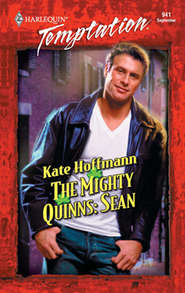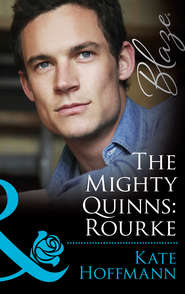По всем вопросам обращайтесь на: info@litportal.ru
(©) 2003-2025.
✖
The Mighty Quinns: Dermot-Dex
Автор
Год написания книги
2019
Настройки чтения
Размер шрифта
Высота строк
Поля
Kate Hoffmann
About the Author
KATE HOFFMANN began writing for Mills & Boon in 1993. Since then she’s published sixty-five books. When she isn’t writing, she enjoys music, theater and musical theater. She is active working with high school students in the performing arts. She lives in southeastern Wisconsin with her cat, Chloe.
Prologue
“SOMETIMES I WONDER what really happened to them.”
Kieran Quinn stared down at the section of weathered bright wood that he’d just sanded. He and his three brothers had had this same conversation over and over again during the past two years. And try as they might, they never came up with any answers to their questions.
The facts were simple. Their parents, Jamie and Suzanne Quinn, had been lost at sea, their boat disappearing somewhere between Seattle and the South Pacific. No one knew what happened, only that they were gone forever. Two years was a long time, but to Kieran, it felt like yesterday.
“Someday, I’m going to take this boat and try to find them,” Dermot announced.
Though his twin brother had always been a dreamer and an optimist, Kieran had been given the practical genes in the pair. Dermot spent his allowance like he had a bottomless piggy bank. Kieran saved every penny. Dermot was the first one to jump, Kieran always looked very carefully before leaping. Dermot saw the possibilities in every situation while Kieran saw the pitfalls.
Kieran glanced over at the section of teak that Dermot had been sanding. It was rough and uneven. Even at work, Dermot favored speed over quality. But then, the four brothers were all different. It was hard to believe they came from the same parents.
Cameron, the eldest, was quiet and creative, so clever that he immediately knew exactly how to get a job done. Their baby brother, Ronan, was sensitive and compassionate, the kind of kid who stuck up for the underdog. Yet their brotherly bonds were unbreakable. They always stood together.
He and his brothers were in the process of restoring an old 22-foot sloop that had been abandoned at their grandfather’s boatyard. Though their grandfather insisted that they were too young to take it out on their own, that didn’t stop them. They’d been working on it for nearly a year, after school and on weekends, and had hoped to put it in the water to celebrate Cameron’s fourteenth birthday.
“I used to think about it all the time,” Cameron murmured. “Now, it just makes me sad. We’re never going to figure it out.”
“It makes me mad,” Dermot said. “Why didn’t they wait for us? Maybe if we’d been along, things might have been different.”
“You really think so?” Ronan asked. Since the accident, any mention of sailing made the youngest Quinn uneasy. He had stubbornly refused to set foot on a boat, making family sailing trips with their grandfather impossible.
Kieran felt a mixture of both—anger and sadness. Their lives would have been so much different had their parents lived. Instead of just surviving their grief, they’d be laughing and loving and enjoying every day. He’d seen each of his brothers change in significant ways, but he’d felt the change in himself the most.
He’d become cautious and careful. He wasn’t willing to take any chances. He preferred his life to be perfectly ordered, so he knew exactly what to expect from day to day. He did his homework early, he completed his chores without complaint and he avoided conflict at every cost. It was hard to know what turns life would take, but Kieran did all he could to anticipate the future.
He didn’t want to be unprepared again. Two years ago, he and his brothers had gone to the marina to wave goodbye to their parents. Their father had told Cameron to watch over his younger brothers and their mother had kissed them each goodbye, her eyes filled with tears. None of them had ever anticipated what was about to happen. Nor could they have been prepared for it even if they had.
When Jamie and Suzanne Quinn were a week late for their arrival, the boys and their grandfather were concerned but not worried. Many things could delay a trip seven days—broken rigging, the doldrums, a torn main sail.
But when a week stretched into two weeks and then a month, everyone was forced to face the truth. Something bad had happened. After a year, a funeral was held. The boys filled a single empty casket with memories of the parents they’d lost.
To help them deal with their grief, Martin Quinn put the boys to work at the boatyard. “Work will soothe a troubled mind,” he told them. “Work will make you strong.”
Martin had used work to get over his own grief many years before, when their grandmother had died in childbirth. Martin had come to the U.S. from Ireland two years later, a widower with his young son, hoping to make a new life for himself away from a homeland that held so many sad memories.
Dermot sat down next to Kieran and grabbed a worn piece of sandpaper. “I know they’re dead. But what I really want to know is why.”
“When we finish this boat, you can sail it across the ocean and find out,” Ronan said.
Kieran drew a sharp breath. “This boat will never get out of the marina without sails. Where are we going to find the money to buy those?”
Cameron sat back on his heels. “We can maybe find something used. Still, we’re all going to have to pitch in some cash.” He looked at Dermot. “How much do you have saved?”
Dermot shrugged. “I don’t know. Maybe twenty dollars.”
“Ronan?”
“One-hundred-seventy dollars,” the nine-year old said.
“Jaysus,” Cameron muttered. “You’re like a little squirrel.”
Ronan grinned. “I count it every week. You can have it all.”
“No,” Cameron said. “We all have to contribute equally.”
“That doesn’t seem fair, considering Ronan is never going to go out on the boat,” Kieran said. “He should contribute less.”
His little brother shrugged. “I don’t mind,” he said in a quiet voice.
“How much do you have?” Cameron asked, turning to Kieran.
Kieran knew exactly what he had in the bank. He even knew how much he made every month in interest. And he knew that putting his money into sails for a boat they probably wouldn’t be allowed to sail was foolish. He was saving his money for something more important—he just wasn’t sure what that was. But someday, he’d need money and he’d be the only brother to have it.
“Enough,” Kieran said.
“He knows,” Dermot said. “He knows to the penny how much he has.”
“Over a thousand,” Kieran admitted. “But I’m not spending it all on this boat.”
Cameron gave him a pat on his shoulder. “We decide as a group. And we all contribute the same. We’re brothers.”
Kieran nodded. “We’re brothers,” he murmured.
They’d all managed to survive together. But Kieran had to wonder how long that would last. Someday, Cameron would leave for college, perhaps in a place far away from Seattle. Dermot had big dreams of traveling the world. And Ronan would undoubtedly find a safe place for himself to settle.
But even if they were separated by distance, the four Quinn brothers had a bond that no one could break, a bond forged by a family tragedy and strengthened by a childhood spent watching out for each other.
“You know what we should do,” Kieran said. “We should build ourselves a boat from scratch. Once we get this one fixed, we can sell it and build something we really like. Something bigger and better. After all, we got this boat for free and I bet, fixed up, we could sell it for fifteen thousand.”
“Oh, man, that would be so cool,” Dermot said. “Do you think Grandda would let us build our own boat?”
“Sure,” Cameron said, clearly excited by the suggestion. “We’ll tell him it will help us learn the business better. I’ve got some really cool designs we could look at. And when it’s done and we’re all old enough, we’ll just leave.”
“Where will we go?” Ronan asked, trepidation in his voice.
“The South Pacific,” Cameron replied. “We’ll go say goodbye to Ma and Da.”
Ronan looked a little green at the thought. Kieran glanced over at his twin brother and their gazes met. Dermot understood. They just needed to feel what their parents felt, to see what they’d seen and then maybe, they could finally put the past behind them and build lives of their own.
1











